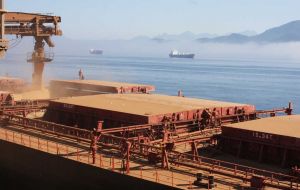MercoPress. South Atlantic News Agency
Brazil’s boom crops expose port congestion and lack of infrastructure
 Soybean production in one year jumped from 65 million to 82 million tons
Soybean production in one year jumped from 65 million to 82 million tons Brazil’s soybean production has reached record levels this season which could make the country the world’s leading producer but port congestion and lack of storage capacity are impeding exports of soybean as producers fear losing international markets.
Leonardo Sologuren, director of the Brazilian business consulting group Clarivi, says the reason for the bottlenecks at the ports is that the logistics and infrastructure haven’t kept pace with soybean production.
“In Brazil there was an increase in soybean production from 2012 to 2013 from 65 million tons to 82 millions tons” says Sologuren.
According to a survey done by the Brazilian government agency National Food Supply Company (CONAB), farmlands dedicated to soybean production have grown by 10.4% compared to last year. The same survey, however, showed a decline in exports compared to previous years due to logistics limitations.
CONAB also anticipates demand for Brazil’s soybean will continue to be strong in 2013, with international markets particularly China, hungry for the product. Brazil is currently competing with the United States for markets in Asia and Europe and other regions.
Sologuren says there are a number of factors contributing to the congestions at the ports. There are transportation disruptions due to rain, a lack of sufficient storage facilities, a shortage of trucks, limited waterways and railways, and other factors.
Daniel Furlan Amaral, manager of economics at the Brazilian Association of Vegetable Oil Industries (ABIOVE), says that the fact that the corn crop is also having a high production year means that transportation routes and infrastructure have been even more limited for soybean this year.
In Paranaguá port in Paraná State, the main port of export for soybeans and other food products in Brazil, there were a total of 27 days of shipment stoppages due to rainfall in less than three months this year. This is more than twice the number of shutdowns during the same time last year with only 13 days, according to Luiz Henrique Dividino, the superintendent of the port.
“We still have the complication of working simultaneously with two products: Corn is still being shipped, which competes with the flow of soybean. But looking at the scheduling of ships, we see that there are only a few boats left that are to take the corn, and within a few days we can start moving the soybean,” Dividino says.
High humidity is another hindrance to the movement of soybean, as it could damage the beans while they are in storage.





Top Comments
Disclaimer & comment rules
Read all commentsCommenting for this story is now closed.
If you have a Facebook account, become a fan and comment on our Facebook Page!